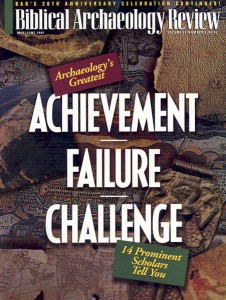A Case Worse Than the Dead Sea Scrolls: Leading Scholar Denied Access to Elephantine Ostraca
Sidebar to: Did the Ark Stop at Elephantine?
Old rules die hard. The old rule that no one—not even other interested scholars—can see ancient inscriptions until they are published (regardless of how long that takes) is alive and well in Paris.
We thought that rule was finally abandoned after the worldwide outcry against the secrecy over the Dead Sea Scrolls recovered nearly 40 years earlier. Now we have learned of another case in which inscriptions excavated nearly a century ago remain unavailable even to the world’s leading expert on similar inscriptions.
This case involves more than 250 ostraca—writings on broken pieces of pottery, the ancient equivalent of notepaper—recovered during French excavations between 1906 and 1908 at Elephantine, an island in the Nile near the First Cataract. The ostraca date to about the early fifth century B.C.E. and are written in ancient Aramaic.
At the same site, large quantities of Aramaic papyri were also recovered by local villagers and, later, by German excavations. Almost all of these papyri have been published and have been intensely studied by generations of scholars.1 Not so the ostraca.
Already a library member? Log in here.
Institution user? Log in with your IP address.

